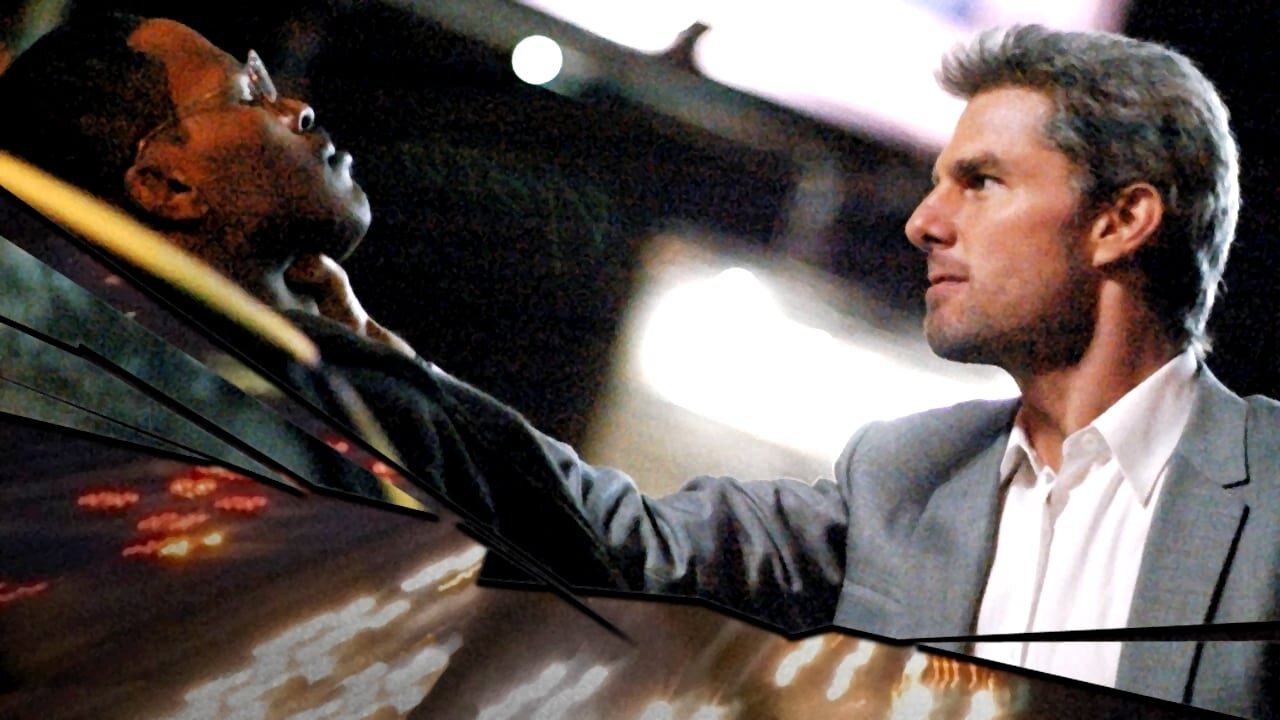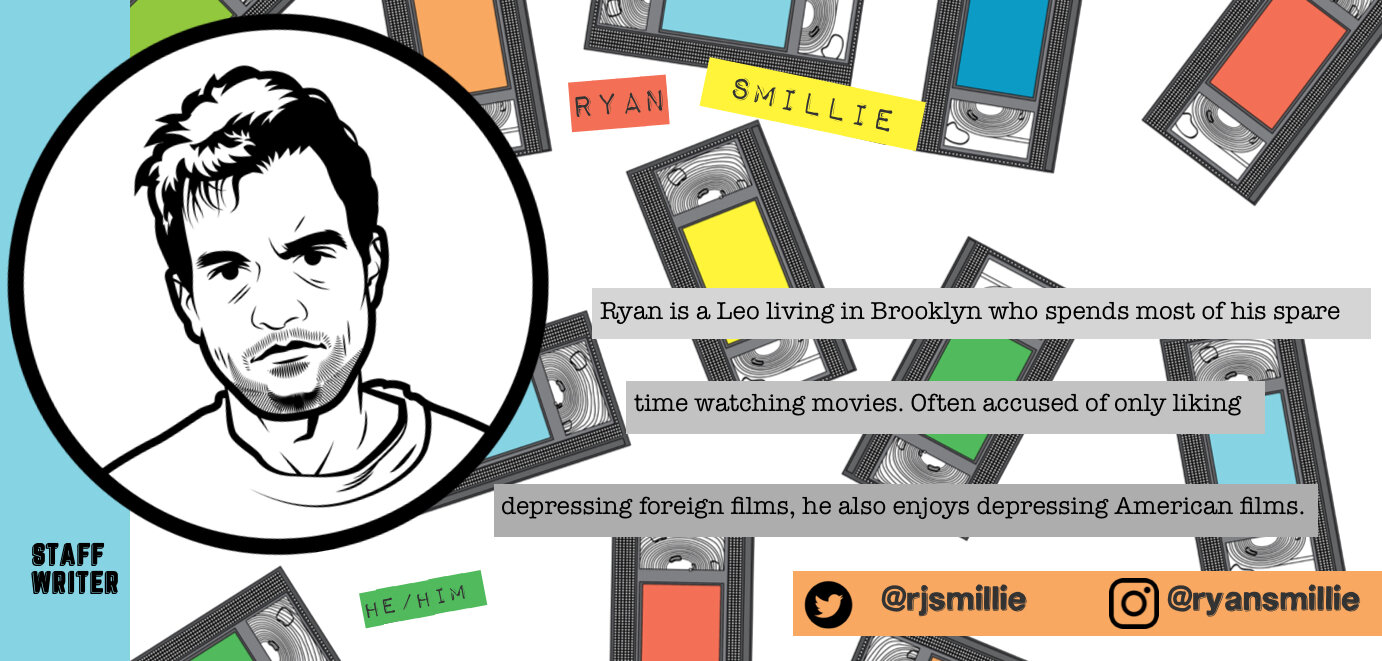COLLATERAL brought icy cold to the heat of summer
For the next few weeks, we will be counting down our 25 favorite blockbusters! Read all of the entries here.
23. Collateral (dir. Michael Mann, 2004)
by Ryan Smillie, Staff Writer
When I think about summer movies, I think about heat. I think about Do the Right Thing and 12 Angry Men: neither exactly blockbusters, but both dripping in sweat, heavy with tension, and about to explode. I think about the pulse-pounding and sticky adventures of Jurassic Park and Raiders of the Lost Ark. I think about the beaches of Jaws’ Amity Island or Mad Max: Fury Road’s apocalyptic Namib Desert.
Collateral, then, despite its August 2004 release, might just be the anti-summer blockbuster. Having already mastered Heat, director Michael Mann emphasizes the coldness of Collateral–and everything about Collateral is cold. From Dion Beebe’s chilly blue cinematography to Tom Cruise’s psychopathic villain (and his ice blonde hair), Collateral feels like a relentless blast of air conditioning. Its Los Angeles is sapped of warmth, a neon-lit expanse of dark streets, back rooms, and foreboding windows.
That isn’t to say it’s out of place among summer blockbusters. Quite the opposite, in fact. Collateral’s racing heart and cold sweat may feel more like a panic attack than a swashbuckling romp, but that doesn’t make it any less exciting. While I’d say Michael Mann has made better movies, none match Collateral’s level of pure entertainment.
And for that, you have to give credit to Jamie Foxx. As Max, the unlucky cabbie in way over his head, Foxx harnesses the full force of his charisma for a deceptively simple character. He’s not just a convincing everyman but the driving force (pun intended) of the movie. Max’s flirtation with a busy but amused lawyer (Jada Pinkett Smith), his ambition to own his own company, and his lies to his mother about said company offer up enough material for a movie of its own. But once Cruise’s hitman, Vince, gets into the back of Max’s cab, his own drama takes a backseat.
(Can we take a moment to recognize how much fun Tom Cruise has as Vince? Instead of yelling at his crew or filming in space, this is what Tommy C. ought to be doing! Dye his hair and make him fully commit to a crazy, villainous character. It works in Interview with the Vampire, it works here – someone get Tommy some hydrogen peroxide and let’s do it again!)
With Vince as his passenger, Max gets drawn into a series of increasingly dangerous situations, most of which he never knows the full implications of. In a way, there’s a hint of a proto-Uncut Gems, with every scene seeming to spiral further and further out of control. But where Adam Sandler’s Howard Ratner was the manic architect of his own undoing, Max is at the mercy of his passenger-turned-captor (interestingly enough, though, Adam Sandler was cast as Max before Jamie Foxx too the role).
Foxx easily slides into both sides of Mann’s signature cat-and-mouse dynamic, as both prey and predator. His dynamism, deployed in a completely different way for his Oscar-winning performance in Ray that same year, creates subtle layers to his character as the night goes on. Max isn’t only an unwitting victim, but a scared hostage, a shamed liar, and an angry man who’s had enough, regardless of the danger he’s fallen into. And Stuart Beattie’s script allows Max the opportunity to turn the tables on Vince, which Foxx slides into seamlessly. It’s the same resourcefulness he uses to navigate the highways of LA that sees him outwitting Vince as he attempts to assassinate his last target. The same Max who winces when Vince forces him to curse out his boss enters a shootout with no problem because it’s the only way he’s getting out of this night alive.
A different movie might focus on Mark Ruffalo’s narcotics detective slowly piecing together the link between all of Vincent’s victims. Another might focus on the criminal underworld that’s hired Vincent to take out witness about to testify against Javier Bardem’s drug lord. But with kind-hearted and mild-mannered Max at the center of Collateral, Mann makes the audience the mouse to his directorial cat. We’re thrown into something we can only figure out as its going on, and our lives recede into the background as a more dangerous and exciting story comes into focus. From the beginning, Mann has us in his clutches and I wouldn’t have it any other way.
One of the pleasures of summer moviegoing is getting out of the sun and sitting in the cold, in the dark for a few hours. And what is Collateral if not two hours of movie-theater-strength air conditioning? It’s a different sort of summer blockbuster experience, downbeat and maybe even a bit demented (in the best possible sense). But if you really think about it, Collateral reflects the physical sensation of seeing a big summer movie in the middle of August. Is it the anti-blockbuster or a blockbuster in its purest form? Maybe it’s a bit of both.




